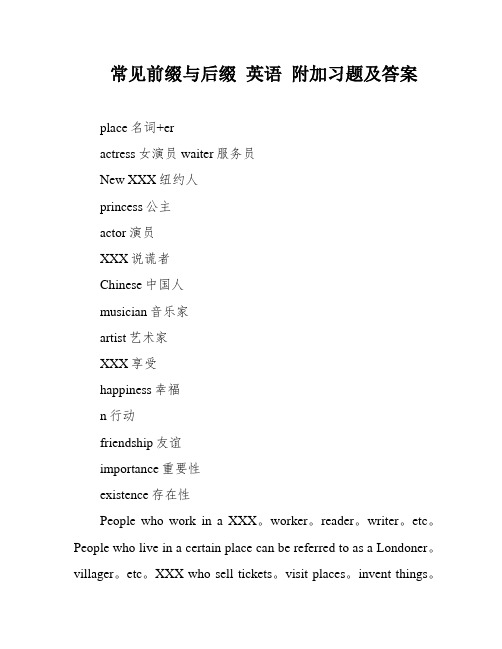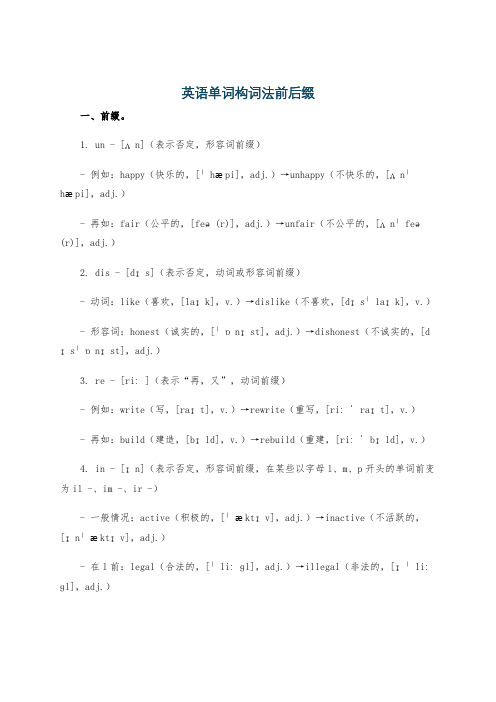(完整版)英语各种词性前后缀及习题
常见前缀与后缀 英语 附加习题及答案

常见前缀与后缀英语附加习题及答案place名词+eractress女演员waiter服务员New XXX纽约人princess公主actor演员XXX说谎者Chinese中国人musician音乐家artist艺术家XXX享受happiness幸福n行动friendship友谊importance重要性existence存在性People who work in a XXX。
worker。
reader。
writer。
etc。
People who live in a certain place can be referred to as a Londoner。
villager。
etc。
XXX who sell tickets。
visit places。
invent things。
act。
or survive XXX as a conductor。
visitor。
inventor。
actor。
or survivor。
respectively。
People who edit or beg for a living can be XXX to as Chinese。
Japanese。
etc。
People who work inXXX as a musician。
physician。
scientist。
dentist。
etc。
People who hold XXX。
The state of being happy or ill can be XXX。
The state of being a XXX can also be formed by adding the suffix -ful。
XXX suffixes like -al。
-an。
-ern。
-able。
-ful。
-ish。
-ive。
-y。
-en。
-ous。
-ary。
-ic。
-some。
-like。
-ly。
or -less to certain root words。
(完整版)英语各种词性前后缀及习题

各种词性前后缀1. 常见前缀2. 名词后缀3 . 形容词后缀4. 动词后缀5. 副词后缀-ly是最常见的副词后缀, 可以附加在形容词后,构成与原形容词意义相同的副词。
如:slowly 缓慢地happily高兴地truly 真实地wholly 全部地simply 纯粹地练习1. 动词、介词、冠词、物主代词等词后一般接名词或动名词, 如果所给单词是其它词类, 就要将其改为名词, 并注意名词数的变化。
(1)Do you know the ______ (deep) of the river?(2)His _____ (careful) resulted in the terrible accident(3)He is one of the ______ (science) who support this theory.答案:(1) depth (2) carelessness (3) scientists2. 动词、介词后一般接名词或动名词, 如果所给单词为动词,就要看该动词是否有名词形式,如果有名词形式,就用其名词形式;如果该动词没有名词形式,就用其动名词。
如:(1)Please pay ________ (attend) to your handwriting.(2) His _______ (arrive) made the situation worse.(3)The teacher was angry at my _________ (come) late.答案:(1) attention (2) arrival (3) coming3. 动词前后、形容词前后可有副词。
如果所需词为副词时, 还要考虑副词级的变化。
如:(1)The boy ran ______ (quick) to school.(2)“What’s that?”Father shouted ______ (angry).(3)The little girl is ______(extreme)eager to know the result of the exam。
英语常见-后缀+前缀-词性(全!!)

英语常见-后缀+前缀-词性(全!!)英语常见-后缀+前缀-词性(全!!)英语常见后缀词性1. 名词后缀1)-or/er/ess/crat/cis:做某件事情或职业的人或物:worker, debtor2)-acy, 表示/性质,状态,境遇/ democracy, accuracy, diplomacy3)-ance, -ence表示/性质,状况,行为,过程,总量,程度/ importance, diligence, difference, obedience4)-ancy, -ency, 表示/性质,状态,行为,过程/ frequency, urgency, efficiency5)-bility, 表示/动作,性质,状态/ possibility, flexibility, feasibility6)-dom, 表示/等级,领域,状态/ freedom, kingdom, wisdom7)-hood, 表示/资格,身份,年纪,状态/ childhood,manhood, falsehood8)-ion, -sion, -tion, -ation, -ition, 表示/行为的过程,结果,状况/ action, solution, conclusion, destruction, expression, correction9)-ism, 表示/制度,主义,学说,信仰,行为/ socialism, criticism, colloquialism, heroism10)-ity, 表示/性质,状态,程度/ purity, reality, ability, calamity11)-ment, 表示/行为,状态,过程,手段及其结果treatment, movement, judgment, punishment, argument12)-ness, 表示/性质,状态,程度/ goodness, kindness, tiredness, friendliness13)-ship, 表示/情况,性质,技巧,技能及身份,职业/ hardship, membership, friendship14)-th, 表示/动作,性质,过程,状态/ depth, wealth, truth, length, growth15)-tude, 表示/性质,状态,程度/ latitude, altitude(海拔)16)-ure, 表示/行为,结果/ exposure, pressure, failure, procedure(手续)17-grapy, 表示/……学,写法/ biography, calligraphy, geography18)-ic, ics, 表示/……学……法/ logic, mechanics, electronics, linguistics19)-ology, 表示/……学……论/biology, zoology, technology(工艺学)20)-nomy, 表示/……学……术/ astronomy, economy, bionomy(生态学)2. 形容词后缀1)-able, -ible, visible, flexible2)名词-ish, foolish, bookish, selfish(注意accomplish, vanish)3)-ive, active, sensitive, productive4)-like, manlike, childlike5)名词-ly, manly, fatherly, scholarly, motherly6)-some, troublesome, handsome7)-ful, beautiful, wonderful, helpful, truthful8)-ous, dangerous, generous, courageous, various9)-ent, violent10)-most, foremost, topmost11)-less, 表示否定countless, stainless, wireless3. 动词后缀1)-ize, ise, 表示/做成,变成,……化/ modernize, mechanize, democratize, organize2)-en, 表示/使成为,引起,使有/ quicken, weaken, soften, harden3)-fy, 表示/使……化,使成/ beautify, purify, intensify, signify, simplify4)-ish, 表示/使,令/ finish, abolish, diminish, establish5)-ate, 表示/成为……,处理,作用/ separate, operate, indicate4. 副词后缀(形容词)-ly:bad→badly坏地,恶劣地,careful→carefully小心地-wise(OE):clock→clockwise(a./adv.)顺时针方向的(地); like→likewise同样地-wards:out→outwards向外面地,north→northwards向北方地英语常见前缀意思前缀没有特别重要的含义,只是表示简单的方向感,类似汉语中的前、后、左、右等,放在单词之首,配合词根来表达单词的含义,常用的有九种一.分表示否定的前缀1.dis-加在名词、形容词,动词之前。
英语前后缀归纳(详细版)

英语前后缀归纳(详细版)2、pre-加在名词,形容词和动词前:preheat(预热)、n(预防)、premature(过早的)3、fore-加在名词,形容词和动词前:foresee(预见)、XXX(祖先)、forehead(前额)4、pro-加在名词,形容词和动词前:proactive(积极主动的)、prosperous(繁荣的)、proceed(继续进行)5、ante-加在名词前:XXX(前事)、XXX(前厅)、antedate(先于)三、表示“后after”的前缀1、post-加在名词,形容词和动词前:postgraduate(研究生)、postpone(推迟)、ar(战后的)2、after-加在名词,形容词和动词前:aftermath(后果)、afternoon(下午)、XXX(事后想法)后缀一、名词后缀1、-ment:表示“状态,行为或结果”,如:enjoyment(享受)、agreement(协议)、movement(运动)2、-ness:表示“状态或品质”,如:happiness(幸福)、kindness(友善)、darkness(黑暗)3、-ity:表示“状态或品质”,如:reality(现实)、XXX(平等)、diversity(多样性)4、-XXX:表示“行为或过程”,如:XXX(教育)、XXX(交流)、XXX(竞争)5、-er/-or:表示“人或物”,如:XXX(教师)、actor(演员)、doctor(医生)二、形容词后缀1、-ful:表示“充满的”,如:colorful(色彩斑斓的)、wonderful(神奇的)、helpful(有帮助的)2、-less:表示“没有的”,如:hopeless(无望的)、useless(无用的)、fearless(无畏的)3、-able/-ible:表示“能够的”,如:comfortable(舒适的)、flexible(灵活的)、visible(可见的)4、-al/-ial:表示“关于的”,如:nal(国家的)、financial(金融的)、social(社会的)5、-ous/us:表示“有…性质的”,如:famous(著名的)、us(美味的)、us(好奇的)1.Pre- means before。
高考英语单词常见前后缀总结

高考英语单词常见前后缀总结一:表示否定的前缀un-否定,不例子:unhappy(不开心),unfair(不公平的),unusual(不寻常的),unknown (未知的),undo(撤销)in-, im-, ir-, il-否定例子:invisible(不可见的),impossible(不可能的),irregular(不规则的),illogical(不合逻辑的),incorrect(不正确的)dis-否定,相反例子:dislike(不喜欢),disagree(不同意),dishonest(不诚实的),disconnect (断开),distrust(不信任)non-否定,不例子:nonstop(不停的),nonfiction(非虚构的),nonsense(无意义的话),nonexistent(不存在的),nonviolent(非暴力的)a-, an-无,不,非例子:amoral(无道德的),asymmetry(不对称),anarchy(无政府状态),anonymous(匿名的),anhydrous(无水的)二:表示“...之前”的前缀pre-前,预先例子:prefix(前缀),prepare(准备),prepay(预付),preview(预览),preexist(先存在)fore-前例子:forecast(预报),foresee(预见),forehead(前额),foretell(预言),forefront(最前线)三:表示“后”的前缀post-后,之后例子:postpone(推迟),postwar(战后的),postgraduate(研究生的),postscript (附言),postmortem(事后分析)四:表示“再一次”的前缀re-再,重新例子:restart(重新开始),review(复习),rebuild(重建),replay(重播),recall(召回)五:其他前缀auto-自动,自己例子:automatic(自动的),autonomy(自治),autograph(亲笔签名),autobiography(自传),autopilot(自动驾驶)bi-二,双例子:bicycle(自行车),bilingual(双语的),biweekly(双周刊),bilateral (双边的),bipolar(双极的)co-, col-, com-, con-, cor-共同例子:cooperate(合作),collaborate(合作),combine(联合),connect(连接),correlate(关联)anti-反抗,对立例子:antiwar(反战的),antibody(抗体),antiseptic(抗菌的),antithesis (对立面),anticlimax(突降)ex-, e-外,出例子:export(出口),emit(发出),exclude(排除),external(外部的),exit(出口)后缀总结一:名词后缀-ment 行为或过程例子:development(发展),management(管理),achievement(成就),agreement (协议),government(政府)-ness 状态,性质例子:happiness(幸福),darkness(黑暗),kindness(仁慈),weakness(弱点),sadness(悲伤)-ion, -tion 动作或状态例子:decision(决定),action(行动),celebration(庆祝),operation(操作),education(教育)-ance, -ence 状态,性质例子:importance(重要性),confidence(自信),existence(存在),resistance (抵抗),dependence(依赖)-ist 从事……职业的人例子:artist(艺术家),scientist(科学家),pianist(钢琴家),novelist(小说家),dentist(牙医)二:动词后缀-ize, -ise 使……化例子:realize(实现),modernize(使现代化),finalize(完成),organize(组织),utilize(利用)-en 使成为……例子:strengthen(加强),shorten(缩短),widen(加宽),broaden(拓宽),deepen(加深)-ify 使……例子:justify(证明……正当),simplify(简化),clarify(澄清),intensify (加剧),verify(核实)三:形容词后缀-able, -ible 可……的,能……的例子:readable(可读的),sensible(可感知的),manageable(可管理的),edible(可食用的),flexible(灵活的)-ful 充满……的例子:joyful(充满喜悦的),careful(小心的),hopeful(充满希望的),useful (有用的),thoughtful(体贴的)-ous, -ious 充满……的,具有……性质的例子:dangerous(危险的),curious(好奇的),famous(著名的),mysterious (神秘的),various(各种各样的)-ic, -ical ……的,属于……的例子:historic(历史的),logical(逻辑的),musical(音乐的),comic(喜剧的),scientific(科学的)-less 无……的例子:hopeless(无望的),careless(粗心的),homeless(无家可归的),fearless (无畏的),meaningless(无意义的)四:副词后缀-ly 以……方式例子:quickly(迅速地),happily(快乐地),sadly(悲伤地),easily(容易地),quietly(安静地)-ward(s) 朝向,向……例子:forward(向前),backward(向后),upward(向上),downward(向下),inward(向内)-wise 以……方式,关于……例子:clockwise(顺时针地),likewise(同样地),otherwise(否则),lengthwise (纵向地),sidewise(横向地)-ily 以……的方式例子:happily(高兴地),lazily(懒惰地),easily(轻易地),crazily(疯狂地),noisily(吵闹地)以上就是常见的英语前缀后缀。
英语前后缀构词法练习

词缀构词法练习I.Classify the following prefixes according to the meaning.1.前____________________________________________________________________ 2.后____________________________________________________________________ 3.上____________________________________________________________________ 4.下____________________________________________________________________ 5.内____________________________________________________________________ 6.外____________________________________________________________________ 7.中间__________________________________________________________________ 8. 周围___________________________________________________________________II.Choose the definition from Column B that best matches each prefix in Column A.Group OneA B( ) 1. pre- ( ) a. under( ) 2. retro- ( ) b. down( ) 3. pro- ( ) c. around( ) 4. post- ( ) d. out( ) 5. sub- ( ) e. before( ) 6. de- ( ) f. backward( ) 7. intra- ( ) g. between( ) 8. ex- ( ) h. after( ) 9. inter- ( ) i. inside( ) 10. circum- ( ) j. forwardGroup TwoA B( ) 1. macro- ( ) a. many( ) 2. mal- ( ) b. new( ) 3. bene- ( ) c. good, well( ) 4. multi- ( ) d. large( ) 5. neo- ( ) e. bad( ) 6. micro- ( ) f. small( ) 7. dis- ( ) g. same( ) 8. co- ( ) h. to, toward( ) 9. homo- ( ) i. apart( ) 10. ad- ( ) j. togetherIII.Choose the definition from Column B that best matches each prefix in Column A.从B栏中选择正确的释义和A栏中的前缀搭配。
(完整word版)高中英语-词性规律(前缀+后缀).doc

英语单词词性转换的基本规律. 动词(v.) →名词(n.)(a) 词形不变, 词性改变例如学习:work, study, water, plant, 浇水 , 种植 ), 也可以用作名词等可以用作动词(工作,学习,水,( 工作植物 ).,(b)一些动词在词尾加上 -er 或 -or 之后就变成了表示 " 某一类人" 的名词例如 :work — worker, teach — teacher, sing —singer, jump—jumper, play—player, learn—learner,visit— visitor, invent—inventor,collect—collector 注意 :1)2) 的动词 , 等.以不发音的 e 结尾的动词 , 在词尾加 -r.例如 :drive—driver, write—writer等.以重读闭音节结尾, 且末尾只有一个辅音字母应双写末尾的辅音字母, 再加 -er例如: run — runner, win—winner,begin —beginner 等 .(c) 在动词词尾加上-ment 变成名词例如:achieve — achievement ( 成就)advertise —advertisement//advertising( 广告)agree — agreement disgree — disagreement amuse —amusement ( 娱乐) improve —improvement( 争吵 )commit( 奉献 ) — commitment develop—development (发展)depart—department( 局 , 部 )govern(统治)—government( 政府 )manage— management ( 管理 )equip—equipment (装备)有些单词比较特殊, 需把动词后的 e 去掉再加ment.例如 : argue — argument ( 争论 )(d) 在动词词尾加上-(t)ion/(s)ion变成名词例如 : attract—attraction;instruct—instruction;invent — invention discuss—discussion;express — expression educate—education;graduate — graduation; operate—operation (去 e 再加 "ion")compete — competition; organize改成其他字母再加"tion") decide—decision conclude— organization ( —conclusion (把 e把 de 改为 s 再加 "ion")describe — description描写,描绘(这是特例,不规则变化 )(e)在动词词尾加上 -ance 变成名词例如 : appear—appearance (外貌;出现)perform— performance (演出)accept— acceptance (接受)(f)在动词词尾加 -ing 变成名词 ( 方法与动词变为现在分词的方法相同 )例如 :meet—meeting build—building wait — waitingbathe— bathing say — saying(谚语) mean— meaningend— ending train—training wash— washing注意 : 以重读闭音节结尾, 且末尾只有一个辅音字母的动词, 应双写末尾的辅音字母, 再加 -ing如 :swim—swimming shop — shopping begin —beginning(g)其他一些比较特殊的变化例如 : Beg( 乞讨 ) — beggar( 乞丐 )behave(行为举止 ) — behaviorknow(知道 ) — knowledge( 知识 )fly—flight (飞行)heat( 加热 ) — heat( 热量 )hit ( 撞击 ) —hit( 轰动一时的人或物, 碰撞 )mix( 混合 ) —mixture(混合物)press(按,压) — pressure( 压力 )sit(坐 ) — seat (座位)succeed—success( 成功 )tour— tour(旅游)/ tourist (游客)2. 动词 (v.)→形容词(a) 动词后面加 able, 有此性质 , 特点或属性(adj.)以 e 结尾的动词则去.e 加able, 表示具例如 : afford-affordable;love-lovable(b) 动词后面加ed, 以 e 结尾的动词则直接加d, 表示被动性的属性或特点 .例如 : scatter-scattered use-used(c)不规则的动词则必须记忆 , 记住其过去分词形式 . 规律不大 , 意义同 (b).3. 名词 (n.) →形容词 (adj.)(a)在名词后面加 -y 可以变成形容词 ( 尤其是一些与天气有关的名词 )例如 : rain—rainy, cloud—cloudy, wind—windy, snow — snowy,guilt health —guilty( tourist— healthy, luck内疚的 )— touristy(— lucky,anger游客多的 ) , salt (— angry盐 ) —salty ( 咸的)silk( 丝绸) — silky( 丝绸般的), sleep —sleepy ( 昏昏欲睡的 )注意 :1) 如果以重读闭音节结尾, 且词尾只有一个辅音字母, 这时应双写辅音字母再加"-y".如: sun —sunny, fun — funny, fog — foggy( 有雾的 ), fur — furry( 毛皮的 )2) 少数以不发音的 e 结尾的名词变为形容词时, 应去掉e 再加 "-y".如 : noise—noisy, ice—icy, shine—shiny(发亮的 ), taste( 口味 ) — tasty( 甜的 )(b)名词后面加 -ed, 以 e 结尾的直接加 d.例如 : spot(斑点)—spotted(有斑点的); talent—talented (有天赋的)organize— organized有组织的;balance —balanced( 平衡的 )(c)一些抽象名词在词尾加 -ful 可以变为形容词例如 :care—careful,thank — thankful,help —helpful,use — useful, meaning—meaningful(d)在名词后加 -less 构成含有否定意义的形容词例如 :care — careless(粗心的), use—useless(无用的) hope — hopeless( 没希望的 ) , home— homeless( 无家可归的 )(e)一些以 -ce 结尾的名词 , 把 -ce 改为 -t 变成形容词例如 : difference—different,silence—silent, confidence—confident(f).在名词后加-ly变为形容词例如 : friend—friendly, love—lovely, live---lively(g).在名词后加-ous变为形容词例如 : danger—dangerous(h)名词后面加 -al 变为形容词例如 : music—musical; medicine—medical (这个比较特殊 )(i)名词后面加 -able 变为形容词 , 如果以 e 结尾就去 e 再加"-able".例如 : adjust — adjustable 可调整的value — valuable 有价值的(j)名词后面加 -en 变成形容词例如 : wood — wooden 木制的 wool —woolen羊毛的(k)一些表示国家的名词可以在词尾加 -ese, -ish 或 -n 构成表示国籍 , 语言的形容词例如 :China—Chinese,Japan — Japanese, England —English,America— American, India—Indian, Australia — Australian(注意 Canada— Canadian)4.. 形容词 (adj.)→副词(adv.)▲一般在形容词的词尾加-ly可以变成副词例如 : quick — quickly,slow — slowly,loud — loudly, sudden —suddenly等但是 , 以下几点值得注意:(a)一些以 " 辅音字母 +y" 结尾的形容词 , 要把 y 改为 i 再加-ly例如 : happy —happily, angry — angrily, lucky — luckily, heavy —heavily, noisy —noisily(b)有些以 -ble 或 -le 结尾的形容词 , 去掉 e 加-y例如 :possible—possibly, terrible—terribly(c)少数以 e 结尾的形容词 , 要去掉 e 再加 -ly例如 : true—truly但绝大多数以 e 结尾的形容词仍然直接加-ly例如:polite—politely, wide—widely(d ) 以 -l结尾的形容词变为副词时要在词尾加-ly,以-ll结尾的才在词尾只加-y.例如 : usual—usually, careful—carefully, useful—usefullyfull— fully (以-ll结尾的才只加y)1. 英语 26 个字母中 , a e i o u是元音字母,y 是半元音字母 ,其余都是辅音字母.★所谓半元音就是有时候做元音, 有时候做辅音 .半元音字母y 做元音有 : shy , sky做辅音比如最简单的:yes2.开音节和闭音节开音节分两种 : 绝对开音节和相对开音节绝对开音节指的是" 元音字母结尾" 的音节 ( 例如 we, hi等 )相对开音节是指" 辅音字母 - 元音字母 - 辅音字母 - 不发音的e" 的音节 ,(r除外). (例如,take,make等)比如 :take (在这个单词中,t是辅音,a是元音,k是辅音,e 是不发音的元音)◆在开音节中 ,元音字母发他们在字母表中的音闭音节 ,则是指"辅音字母- 元音字母- 辅音字母" 的音节( -al等除外) (例如:leg,cross等)◆在闭音节中 , 元音字母发不同的音a e i o u例 sat let sit not nut (试着读下这些单词, 这些单词中 , 元音发的音都不是它们在字母表中发的音)2.英语重读闭音节就是以辅音因素结尾的 , 而且是重读音节的音节 .比如 apple 划音节就因该是 ap/ple 前面那个 ap 是一个音节 , 这个音节以辅音因素 p 结尾 , 所以就是闭音节 .( 仅仅能看出是闭音节 , 是不是重读闭音节还要看这个音节是不是重读的 )重读闭音节三要素:1.必须是重读音节;2.最后只有一个辅音字母;3.元音字母发短元音 ( 说通俗点 , 打个比方 , /u/ 是短元音 ,/u:/ 是长元音 )重读闭音节即两个辅音中间夹一个元音如 :sit---sitting begin---beginning(节上 ) .重读在gin 这个音●像 travel 这个单词 ,"vel" 也是 " 辅音 +元音 +辅音 " 的结构 , 但是重音不在vel 这个音节上, 所以不用双写"l", 可以为travelled, 也可以是 traveled, 更常用的是后者 .英语单词词根词缀和词性转换英语中常见的后缀一、名词性后缀1, -age 为抽象名词后缀,表示行为,状态和全体总称percentage百分数,百分率,voltage电压,伏特数,lavage 灌洗,洗,出法,gavage 管词法,curettage刮除法,shortage 不足,缺少。
英语单词构词法前后缀

英语单词构词法前后缀一、前缀。
1. un - [ʌn](表示否定,形容词前缀)- 例如:happy(快乐的,[ˈhæpi],adj.)→unhappy(不快乐的,[ʌnˈhæpi],adj.)- 再如:fair(公平的,[feə(r)],adj.)→unfair(不公平的,[ʌnˈfeə(r)],adj.)2. dis - [dɪs](表示否定,动词或形容词前缀)- 动词:like(喜欢,[laɪk],v.)→dislike(不喜欢,[dɪsˈlaɪk],v.)- 形容词:honest(诚实的,[ˈɒnɪst],adj.)→dishonest(不诚实的,[d ɪsˈɒnɪst],adj.)3. re - [riː](表示“再,又”,动词前缀)- 例如:write(写,[raɪt],v.)→rewrite(重写,[riːˈraɪt],v.)- 再如:build(建造,[bɪld],v.)→rebuild(重建,[riːˈbɪld],v.)4. in - [ɪn](表示否定,形容词前缀,在某些以字母l、m、p开头的单词前变为il -、im -、ir -)- 一般情况:active(积极的,[ˈæktɪv],adj.)→inactive(不活跃的,[ɪnˈæktɪv],adj.)- 在l前:legal(合法的,[ˈliːɡl],adj.)→illegal(非法的,[ɪˈliːɡl],adj.)- 在m前:moral(道德的,[ˈmɒrəl],adj.)→immoral(不道德的,[ɪˈm ɒrəl],adj.)- 在r前:regular(规则的,[ˈreɡjələ(r)],adj.)→irregular(不规则的,[ɪˈreɡjələ(r)],adj.)5. pre - [priː](表示“在……之前”,形容词或动词前缀)- 形容词:school(学校,[skuːl])→preschool(学前的,[ˈpriːskuːl],adj.)- 动词:pay(支付,[peɪ],v.)→prepay(预付,[priːˈpeɪ],v.)6. post - [pəʊst](表示“在……之后”,形容词或名词前缀)- 形容词:war(战争,[wɔː(r)])→post - war(战后的,[ˈpəʊst wɔː(r)],adj.)- 名词:graduate(毕业生,[ˈɡrædʒuət])→postgraduate(研究生,[ˌp əʊstˈɡrædʒuət],n.)二、后缀。
- 1、下载文档前请自行甄别文档内容的完整性,平台不提供额外的编辑、内容补充、找答案等附加服务。
- 2、"仅部分预览"的文档,不可在线预览部分如存在完整性等问题,可反馈申请退款(可完整预览的文档不适用该条件!)。
- 3、如文档侵犯您的权益,请联系客服反馈,我们会尽快为您处理(人工客服工作时间:9:00-18:30)。
各种词性前后缀1. 常见前缀
2. 名词后缀
3 . 形容词后缀
4. 动词后缀
5. 副词后缀
-ly是最常见的副词后缀, 可以附加在形容词后,构成与原形容词意义相同的副词。
如:slowly 缓慢地happily高兴地truly 真实地wholly 全部地simply 纯粹地
练习
1. 动词、介词、冠词、物主代词等词后一般接名词或动名词, 如果所给单词是其它词类, 就要将其改为名词, 并注意名词数的变化。
(1)Do you know the ______ (deep) of the river
(2)His _____ (careful) resulted in the terrible accident
(3)He is one of the ______ (science) who support this theory.
答案:(1) depth (2) carelessness (3) scientists
2. 动词、介词后一般接名词或动名词, 如果所给单词为动词,就要看该动词是否有名词形
式,如果有名词形式,就用其名词形式;如果该动词没有名词形式,就用其动名词。
如:
(1)Please pay ________ (attend) to your handwriting.
(2) His _______ (arrive) made the situation worse.
(3)The teacher was angry at my _________ (come) late.
答案:(1) attention (2) arrival (3) coming
3. 动词前后、形容词前后可有副词。
如果所需词为副词时, 还要考虑副词级的变化。
如:
(1)The boy ran ______ (quick) to school.
(2)“What’s that” Father shouted ______ (angry).
(3)The little girl is ______(extreme)eager to know the result of the exam。
(4). He was very tired after doing this for a whole day, but he felt very happy since the crop did “grow” ______ (height).
答案:(1) quickly (2) angrily (3) extremely (4) higher
4. 在名词前作定语,在系动词后做表语,以及作主语或宾语的补足语时,通常要用形容词如果所需词为形容词时, 还要考虑形容词级的变化。
(1) What’s the ________ (width) river in the world
(2) The _______ (strength) we become, the more modest we should be.
答案:(1) widest (2) stronger
5即时训练
单句填空:用所给单词的适当形式填空。
1. Mary was very ______ at the news, so she looked ______ at her husband, her eyes full of ______ (sad).
2. He ________football very well and he was one of the best ______ in yesterday’s football match. (play)
3. Look! How ________ Kate is laughing! She seems to be the ______ girl in the world (happy).
4. To our ______, the headmaster was very ______ with our report. (satisfy)
5. Edison was a great ________. During his life he had many ______. (invent)
6. I should ________ my task and make it ________ to finish it. (simple)
7. The boy having the ________ of being half starved ________, never to be seen again. (appear)
8. The police _____ the pot and ______ a plot against the President. (cover)
9. You are so _______ to help me. Thank you for your ________. (kindly)
10. Everything is becoming ____________ than before and many college students had to work to make some mone y for their college _____________. (expend)
语篇填空:用所给词的适当形式填空
A
Rafting is an___1__ (excite) adventure. A raft is a small boat that you can use to paddle down rivers and streams. Rafting is a good way to experience___2___(natural) . If you want a normal rafting trip, choose a quiet stream or river that is wide and has few fallen trees or rocks. If you are looking for more___3___(excite), you may want to try whitewater rafting. Whitewater rafting is___4___(adventure)?and___5___(difficulty) than normal rafting. It is done on rivers and streams where the water moves___6___ (quick). You have to be___7___ (care) not to hit rocks, trees and other___8___ (dangerous). The name “Whitewater” comes from the fact that the water in these streams and rivers looks white when it moves quickly. B
Steve Jones is an___1___(environment) expert who tries to keep animals and plants from___2___(become) endangered. If we know more about what causes___3___ (danger), we may be able to take measures before it is too late. A species can become ___4___ (endanger) for___5___ (differ) reasons. Animals and plants must have a habitat or home, which is___6___ (comfort) and clean, and where there is enough food and other
resources. Otherwise they can not live___7___ (comfortable). They are all used to their environment; that is, they have learnt how to live___8___ (succeed) in their habitat.
【参考答案】
一、单句填空
1. sad, sadly, sadness
2. played, players
3. happily, happiest
4. satisfaction, satisfied
5. inventor; inventions
6. simplify, simpler/simple
7. appearance, disappeared
8. discovered, uncovered
9. kind, kindness 10. more expensive, expenses
二、语篇填空
A. 1. exciting 2. nature 3. excitement 4. adventurous 5. difficult
6. quickly
7. careful
8. dangers
B. 1. environmental 2. becoming 3. endangerment 4. endangered
5. different
6. comfortable
7. comfortably
8. successfully。
